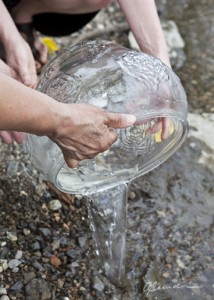Sacred Water: An Easter Reminder
Spirited Reflection – Sunday, April 27, 2014
Laura Marie Piotrowicz is an Anglican priest serving a multi-point rural parish in western Manitoba. Her passions for social and ecological justice feed her volunteer work with the Primate’s World Relief and Development Fund and the Anglican Church’s Creation Matters Working Group.
Our preparations for Easter were liturgically rich, full of traditions and theology. The church – God’s people – celebrated a significant amount of sacrament and sacramental ministry, which the church is then invited to continue throughout the season of Easter and beyond.
One aspect of significance throughout these services was the use of water. Not surprisingly; water plays a key role in our scriptures (with over 700 references, from the Genesis creation to the river in the new Jerusalem of Revelation), used in rituals, parables, miracles, and sacraments. To speak of water alludes to abundance and movement, not unlike God’s grace. The absence of water denotes death and suffering, not unlike a separation from the divine.
During Holy Week and the Triduum especially, water was present:
– On Maundy Thursday we followed Jesus’ example and washed feet as a symbol of servant leadership. The same night, emulating the institution the Lord’s Supper, we use water within the Eucharist itself; a sacrament of abundance, sustenance, and thanksgiving. The wine is mixed with water to symbolize the blood and water that came from Jesus’ pierced side; the water itself a symbol of purity both in the wine and during ablutions.
– Good Friday offers us themes of sacrifice and thirst, demonstrating the challenges of the 1 in 6 people in today’s world who lack access to clean, safe, abundant water. The realities of distribution, commodification, pollution, diversion, and conflict all increase the injustices.
– The Great Vigil of Easter celebrates the history of God’s chosen people with the message of salvation, starting with the waters of creation, journeying into freedom through the Red Sea, celebrating renewal and regeneration. At the Vigil people renew their baptismal vows; baptism in water and the Spirit is not merely a purity ritual but an equalizer and community-builder, as the waters of baptism make us all equal in the eyes of God.
As we, the church, continue to journey through the Easter season, we carry with us the importance and significance of water. We are challenged to examine our use of water in every day life, seeing it not as something that just comes from a tap but a component of our sacramental and covenantal relationship with God, with God’s creation, with God’s people.
Water is integral to all of our celebrations, carrying the richness of the past into the hope of the future. By connecting this respect to our sacraments, we appreciate how important water is to us as spiritual people, and how we are called to ensure that all of God’s people might have access – to water, to sacrament.
Doubting Thomas was only so named because he asked to receive what everyone else already had. How sad, in a culture that wastes its water, to know that we live in a world where Thirsty Thomas is a reality. Our challenge then, as people of faith, is to change this. We are called to recognize the sacred nature of water, the beautiful gift of grace; also to hear the cries of those who do without water. We are then challenged to oppose the structures and systems which would pollute or pervert, destroy or deny this precious resource.
Then our work begins, if we are to truly live the ministry of being an Easter people: to give the thirsty, both physically and spiritually, some water to drink.









